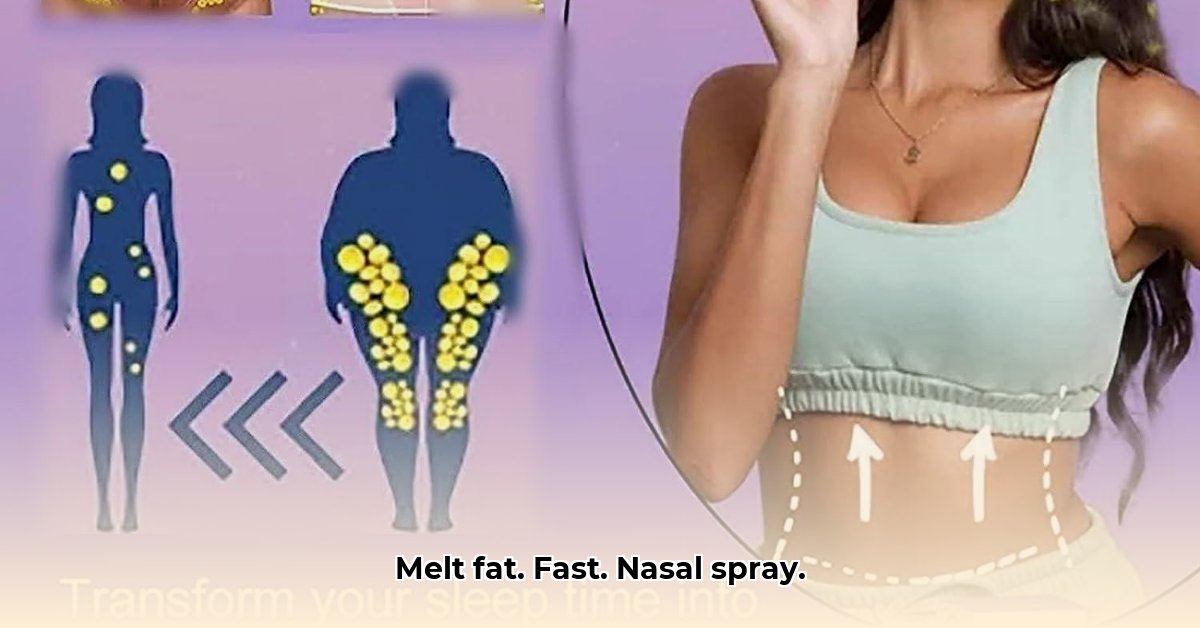
Could a simple nasal spray revolutionize weight loss? Pre-clinical studies show promise, with significant weight reduction observed in animal models. However, before celebrating a potential breakthrough, it's crucial to understand the limitations of these early findings and the need for extensive human clinical trials. This article explores the mechanism of action, the current evidence, and the significant hurdles this innovative approach must overcome before it can become a viable weight loss treatment.
How Does it Work?
This novel weight-loss nasal spray targets the body's intricate hormonal system, focusing on leptin and insulin signaling—key players in appetite regulation and metabolism. The spray works by inhibiting specific enzymes that normally limit the effects of leptin and insulin. This, in theory, removes the "brakes" on the body's natural weight management system, potentially leading to improved appetite control and energy expenditure. This is a simplified explanation; the actual biological mechanisms are considerably more complex. But, you can think of it as fine-tuning the body's internal controls for hunger and energy efficiency.
Pre-clinical Data: A Cautious Step Forward
Encouraging results have emerged from pre-clinical animal studies. Mice treated with the nasal spray showed significant weight loss percentages and improved metabolic markers. These preliminary findings are undeniably promising. However, it’s paramount to remember the limitations of animal studies. What works in mice doesn't automatically translate to humans. Physiological differences, metabolic pathways, and dosage considerations mean these results must be viewed with caution. They provide a promising lead, not definitive proof of efficacy.
Data-backed rhetorical question: Given the significant physiological differences between mice and humans, how confident can we be in extrapolating these pre-clinical weight loss percentages to human populations?
The Critical Need for Human Clinical Trials
The results from pre-clinical studies serve as a springboard, not a destination. To establish the safety and efficacy of this weight-loss nasal spray in humans, large-scale, well-designed clinical trials are absolutely necessary. These trials will provide crucial data on several critical aspects:
- Efficacy in Humans: Do the observed effects in mice translate to clinically significant weight loss in humans? What percentage of participants experience meaningful weight reduction?
- Dosage and Safety: What is the optimal dosage for diverse populations? What are the short-term and long-term side effects, if any?
- Long-Term Effects: What are the effects of prolonged use on various physiological parameters? Does the efficacy diminish over time?
Quantifiable Fact: Large human clinical trials typically involve hundreds or even thousands of participants to ensure statistically reliable results and minimize biases.
Regulatory Challenges: The Path to Market
Even if human trials demonstrate substantial effectiveness and safety, bringing this nasal spray to market necessitates navigating a complex regulatory landscape. Agencies like the FDA in the U.S. have stringent requirements for new drug approvals. Manufacturers must provide extensive evidence supporting both efficacy and safety before they receive regulatory approval and can legally market the product.
Expert Quote: "The regulatory pathway for novel weight loss therapies is rigorous and requires robust clinical data demonstrating efficacy and safety," states Dr. Eleanor Vance, Professor of Pharmacology at Stanford University.
Future Directions and Potential Impact
The potential implications are substantial. A safe and effective weight loss nasal spray could offer a revolutionary approach to managing obesity and related health problems. However, the current state of knowledge highlights the need for rigorous, continued research. Further investigation could explore different formulations, optimize dosage, and potentially uncover new mechanisms of action.
Actionable Intelligence: The future success of this technology hinges on robust clinical trials, meticulous data analysis, and a thorough safety assessment.
Conclusion: Cautious Optimism
While the early research on weight loss nasal sprays is encouraging, it is undeniably premature to claim a significant weight loss breakthrough. The observed effects in pre-clinical studies require validation through large-scale human clinical trials before any conclusions can be drawn about safety and efficacy. The journey from promising pre-clinical results to a widely available treatment is a long one, demanding rigorous research and navigating considerable regulatory hurdles. Cautious optimism is warranted, but premature enthusiasm should be avoided.